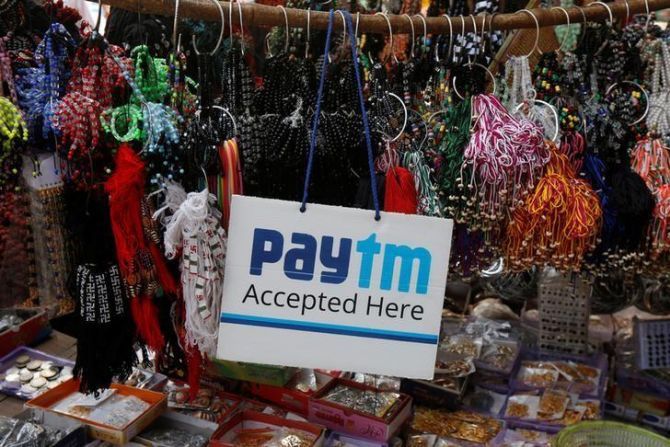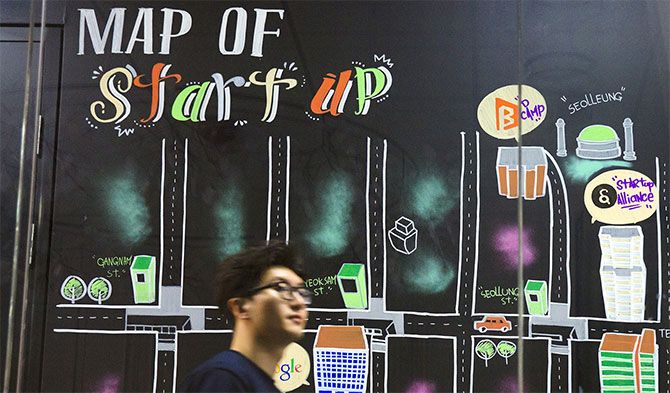In an otherwise agriculture- and public health-focused Union Budget 2018-19, artificial intelligence, machine learning, blockchain technology, internet of things -- jargon that found little or no mention in the previous Budgets -- managed to make their presence felt.

Demonetisation, the shock that jolted the nation in 2016, and digitisation, were the two words that dominated Finance Minister Arun Jaitley's 2017-18 (FY18) Budget speech.
Both symbolised the way forward for the government.
According to industry experts, 2017 was the year of digitisation.
The push for 'going digital', which has been a part of the current government's flagship 'Digital India' campaign, was visible everywhere -- from the villages to the Reserve Bank of India (RBI).
While a lot of initiatives have run simultaneously, problems in infrastructure and clarity in regulations has prevented these programmes from being a complete success.

Money goes digital
The government has pushed for a less-cash society by increasing infrastructure to allow digital payments.
In the last two years, the key proposals have been around promoting digital payments.
Among them, the Unified Payments Interface (UPI) -- an initiative in which the government has been successful -- has been a key one.
From global tech giants such as Google, WhatsApp, to few of the country's biggest mobile wallets, including Paytm, MobiKwik all have adopted the digital payments system.
Till December 2018, UPI has managed transactions of more than Rs 1.02 trillion.
It is live in 129 banks, and has handled over 620 million transactions.
The government has been somewhat successful in reaching out to the tier-II and rest-of-India towns.
According to industry experts, in most of the tier-II and tier-III towns, digital payments have doubled since demonetisation.
"National electronic funds transfer (NEFT) transactions saw an upsurge from Rs 9.88 trillion.
"Mobile banking payments have also seen a spike since September 2015.
"All the digital transactions have collectively registered an increase of 440 per cent since demonetisation.
"Most of the growth has been driven by tier-II and tier-III cities," said Shailendra Naidu, chief executive officer, Obopay, a mobile payment solution firm.
National Payments Corporation of India recorded a whopping 482 million UPI transactions in October 2018 as compared to 0.2 million in November 2016.
However, since demonetisation more than 99 per cent of the cash is back in circulation.
Social infrastructure digitised
The government has, in the last two years, digitised Mahila Shakti Kendras set up in 1.4 million integrated child development scheme anganwadi centres. They provide digital literacy, among others.
It has also launched the SWAYAM platform, with at least 350 online courses to virtually enable students to attend courses, take tests and earn academic grades.
However, there are some problems the government faces in connecting gram panchayats and villages with high-speed data connectivity.
The BharatNet programme, which started in the UPA-II era in 2011, missed its deadlines.
While it was supposed to connect 150,000 villages last year, it has managed to connect around 125,000 village blocks to date.
The delays have been attributed to equipment issues.
However, the government plans to connect 250,000 blocks with the optical network by March 31.

Startup India -- industry seeks more clarity on taxes
In an otherwise agriculture- and public health-focused Union Budget 2018-19, artificial intelligence (AI), machine learning (ML), blockchain technology, internet of things -- jargon that found little or no mention in the previous Budgets -- managed to make their presence felt.
From classrooms to highways, an elaborate plan was laid to bring AI and ML in every aspect of country's infrastructure.
According to industry experts, growth of digitisation has increased and there has been a concerted push towards AI.
This has also led to the growth of Startup India.
However, they are concerned more about the taxes, which have been a hindrance in growth.
"The one key expectation of start-ups from the Budget is complete clarity and consistency on angel tax, which has caused unprecedented levels of discomfort for start-ups and angel investors.
"If not addressed, this can cause a collapse of initial financial support for start-ups, thereby making the entire programme redundant.
"All other expectations and incentives have taken a back seat in light of this large issue facing the startup ecosystem," said Rajan Navani, vice-chairman and managing director, JetSynthesys.












 © 2025
© 2025